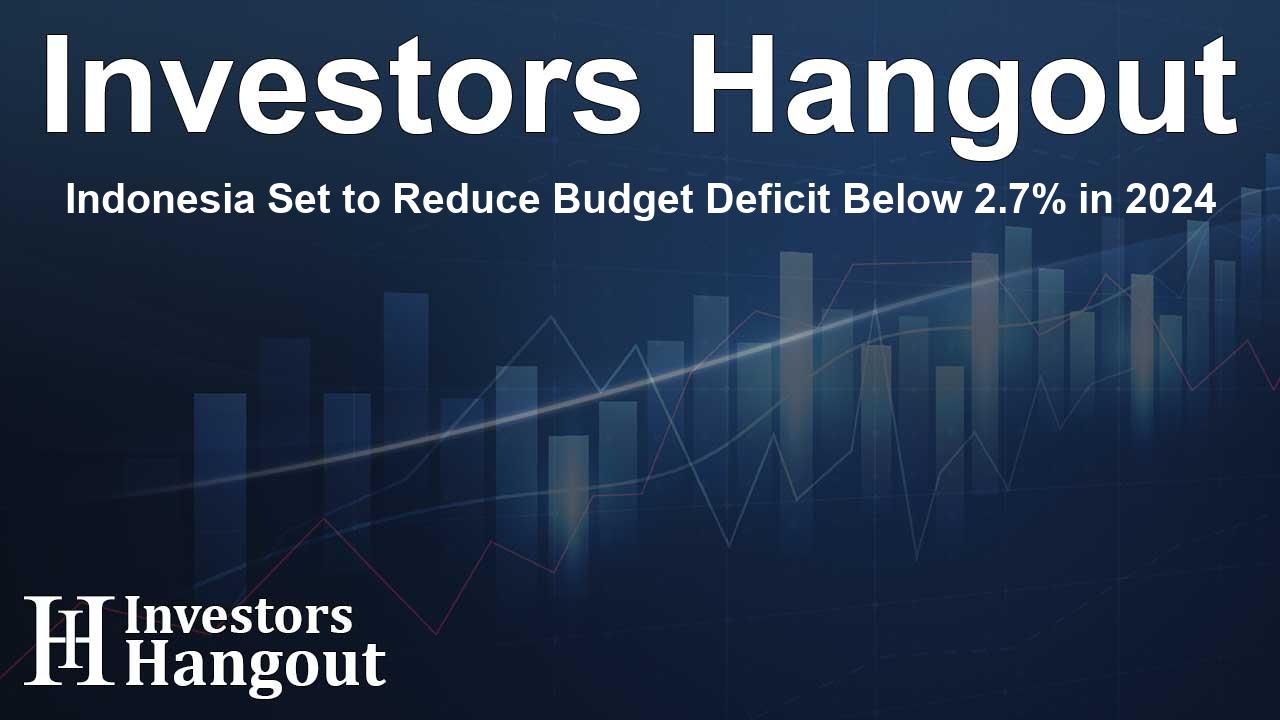Indonesia Set to Reduce Budget Deficit Below 2.7% in 2024

Indonesia's Budget Deficit Outlook for 2024
Indonesia's Finance Minister, Sri Mulyani Indrawati, recently announced an encouraging update regarding the nation's budget deficit for the 2024 fiscal year. She indicated that the deficit would fall below the previous government estimate of 2.7% of the country’s gross domestic product (GDP). This positive development reflects a growing fiscal responsibility that the administration is striving to maintain.
Performance Compared to Original Plans
While Sri Mulyani did not specify the exact deficit figure, she highlighted that it is closely aligned with the government’s original target of a 2.29% GDP fiscal gap. This achievement is being regarded as a significant milestone for Indonesia, as it marks a commitment to fiscal prudence.
“This is a remarkable result,” she expressed during a recent event to welcome the new year at the stock exchange. The minister emphasized that this performance cements a healthier budget framework for 2025, laying down a stable foundation for the country's financial future.
Revenue and Spending Trends
In terms of revenue, Sri Mulyani reported that growth was positive, though it did not meet the government's targets entirely. This indicates a need for adjustments in fiscal strategies to ensure that revenue collections can support upcoming national projects and obligations.
On the expenditure side, spending has notably increased by over 6% compared to the previous year. This rise is attributed to several factors, including funding for upcoming elections, the construction of a new capital city, and expanded welfare programs aimed at improving citizens' living conditions.
Future Economic Plans
Looking ahead, more detailed insights into the fiscal situation will be provided in due course. Sri Mulyani’s updates are a part of Indonesia's broader objective to create a balanced and sustainable economic environment. The government is intent on not only maintaining positive economic growth but also ensuring that fiscal policies align with developmental goals.
Frequently Asked Questions
What is Indonesia's budget deficit projection for 2024?
Indonesia's budget deficit is projected to be lower than 2.7% of GDP for the 2024 fiscal year.
How does the 2024 budget deficit compare to previous estimates?
The 2024 budget deficit is expected to be closer to the original goal of 2.29% of GDP, indicating stronger fiscal management.
What factors contributed to increased spending in 2024?
Increased spending is primarily driven by election costs, new capital construction, and enhanced welfare programs.
Will more detailed budget information be released?
Yes, Finance Minister Sri Mulyani indicated that more detailed information would be shared at a future date.
How does the budget deficit affect Indonesia's economy?
A lower budget deficit can foster a healthier economic environment, providing a stable foundation for future growth and fiscal sustainability.
About Investors Hangout
Investors Hangout is a leading online stock forum for financial discussion and learning, offering a wide range of free tools and resources. It draws in traders of all levels, who exchange market knowledge, investigate trading tactics, and keep an eye on industry developments in real time. Featuring financial articles, stock message boards, quotes, charts, company profiles, and live news updates. Through cooperative learning and a wealth of informational resources, it helps users from novices creating their first portfolios to experts honing their techniques. Join Investors Hangout today: https://investorshangout.com/
Disclaimer: The content of this article is solely for general informational purposes only; it does not represent legal, financial, or investment advice. Investors Hangout does not offer financial advice; the author is not a licensed financial advisor. Consult a qualified advisor before making any financial or investment decisions based on this article. The author's interpretation of publicly available data shapes the opinions presented here; as a result, they should not be taken as advice to purchase, sell, or hold any securities mentioned or any other investments. The author does not guarantee the accuracy, completeness, or timeliness of any material, providing it "as is." Information and market conditions may change; past performance is not indicative of future outcomes. If any of the material offered here is inaccurate, please contact us for corrections.